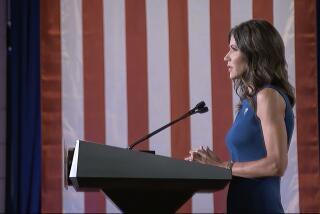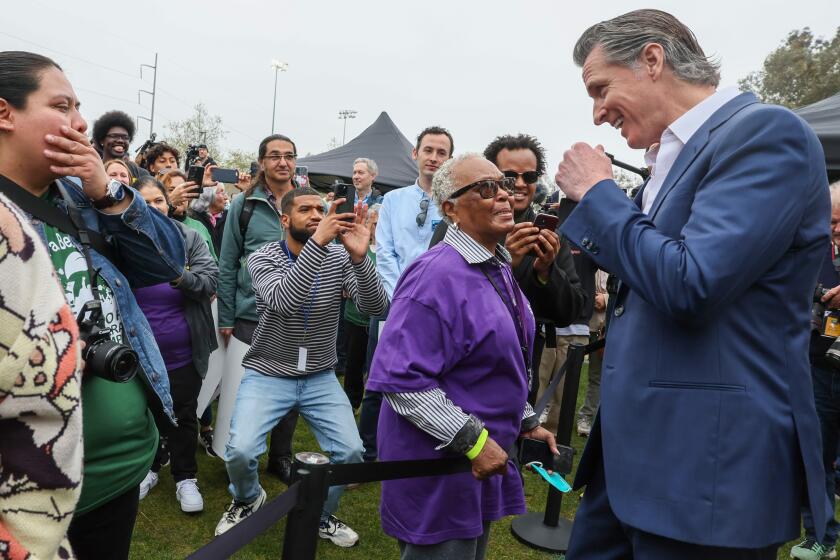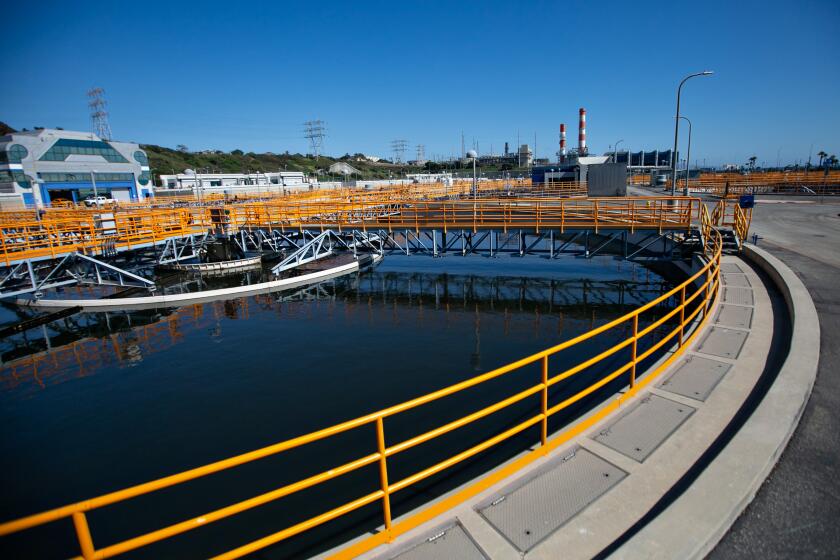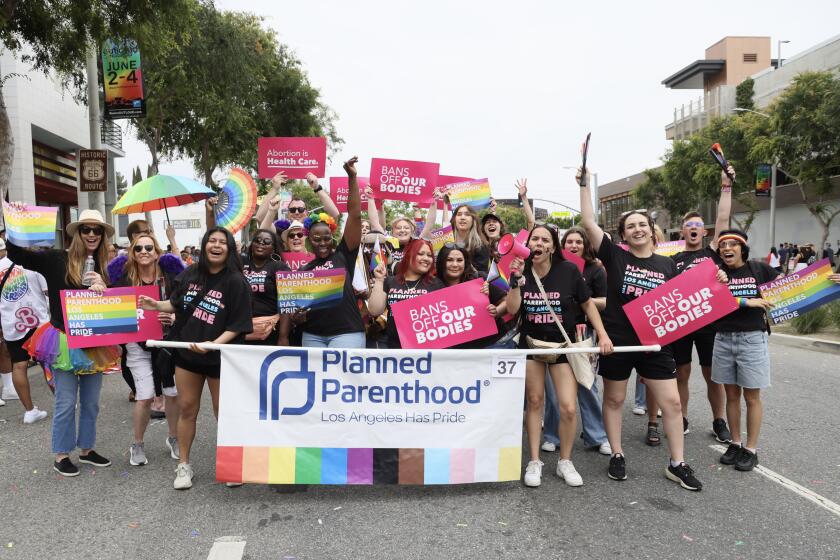Sen. Robbins Investigated in Alleged Extortion Case : Inquiry: Lawmaker says claims he pressured San Diego developer are false. He says he acted properly.
A federal grand jury is investigating allegations that state Sen. Alan Robbins (D-Tarzana) and California Coastal Commissioner Mark L. Nathanson were involved in a scheme to extort $250,000 from a prominent San Diego hotel developer who was trying to block construction of a rival hotel, The Times has learned.
The developer, Jack Naiman, has told investigators he was startled by the alleged demand for a payoff and tried to resist, but was put into “a squeeze” that led him to pay the bulk of the money--some of it in cash--according to sources familiar with the probe.
The allegations of extortion have emerged from an intensifying federal examination of almost every aspect of Robbins’ far-flung business dealings and political activities.
The Federal Bureau of Investigations, the Internal Revenue Service and the U.S. attorney’s office here are trying to determine whether the veteran San Fernando Valley Democrat abused the power of his office for personal gain in violation of state and federal law, sources familiar with the investigation say.
Neither Robbins nor Nathanson has been charged with a crime, and attorneys for both men deny any wrongdoing. But the grand jury is continuing its investigation.
The allegations were brought to investigators by Naiman and Jeremy Simms, a Robbins business partner from La Jolla who has been battling the legislator in a protracted series of civil lawsuits.
Robbins, who is running for reelection, said in a written statement to Times reporters that “if allegations of the nature you describe have been made, they are absolutely false.”
But he added that “because the federal investigation is still pending, my legal counsel has requested that I not comment any further at this time.” He expressed confidence “that I will be found to have acted legally and properly at all times.”
In October, 1989, Robbins acknowledged in a public document that he had received money from Naiman, but said the payments were part of a loan transaction that also involved Simms. He did not report the transaction in detail.
Nathanson, the coastal commissioner who also is a subject of the probe, spoke briefly twice with a Times reporter, but referred most questions to his attorney. Nathanson, a real estate broker and consultant, said he has reported all his income sources on the financial statements that are required to be filed each year with the State Fair Political Practices Commission. The records on file with that watchdog agency show no payments from developer Naiman to Nathanson.
Nathanson’s attorney, Robert L. Shapiro, said Nathanson “certainly did not extort money from Jack Naiman or anyone else.”
U.S. Atty. David F. Levi would not comment on the allegations or even confirm whether there is an investigation.
However, other authoritative sources said the federal probe of Robbins began at least two years ago as an outgrowth of an FBI sting operation to root out corruption in the state Capitol. In recent months, investigators have questioned Robbins’ legislative staff, his business partners and several lobbyists. A number of Robbins’ associates have been questioned by the grand jury.
Federal authorities have subpoenaed Robbins’ financial records, and the IRS has been contacting many of his campaign contributors.
In the course of the wide-ranging investigation, the grand jury also has been looking at how the lawmaker acquired an interest in 1987 in a much-coveted Acura car dealership in the San Diego area as American Honda Motor Co. Inc. was introducing the upscale automobile. Robbins’ profit for about a year has been estimated at between $150,000 and $190,000 by people familiar with the deal.
Other matters under federal scrutiny include Robbins’ ties to an exotic car rental operation in Marina del Rey, his private land deals around the marina and in Ventura County, and a bill that could have affected his financial holdings in the marina.
In addition to the ongoing federal probe, Robbins is the subject of an investigation by the state attorney general’s office, which is trying to determine whether the lawmaker violated statutes barring the personal use of campaign funds.
At least partly in response to the federal and state investigation, Robbins’ campaign committees reported paying about $170,000 in the first six months of 1990 to law firms in San Diego, Los Angeles and Sacramento, according to the committees’ campaign filings.
During his sometimes turbulent 17 years in the Senate, Robbins, 47, has proven to be a politician of considerable resilience. While regarded as something of an outsider--a political loner in the generally clubby upper chamber--he has nonetheless attained power and influence in the Capitol.
Respected for his quick mind and unflagging energy, he has managed to keep a series of complicated private business deals in motion while juggling a heavy legislative load.
Now, federal investigators, looking at Robbins’ various activities, have turned much of their attention to his behind-the-scenes role in what apparently started as a dispute over development in the booming San Diego hotel market.
Several people familiar with the probe agreed to talk to The Times on condition they not be identified. These sources said an account of Robbins’ and Nathanson’s alleged involvement in the hotel controversy has been presented to the federal grand jury.
The struggle over the hotel began in 1987 when San Diego businessman Jack Naiman, after five years of planning, was securing the financing he needed for his Aventine project--an office building, athletic club and hotel-restaurant complex in La Jolla just off the I-5 Freeway.
With the future of the $150-million project still unsettled, Naiman became concerned about a competing proposal. Plans were being made for a Sheraton hotel a few miles away on city-owned land--a picturesque ocean-view site overlooking the Torrey Pines Municipal Golf Course.
The 48-year-old Naiman, born in Lima, Peru, is described as a restless entrepreneur and a connoisseur of art and architecture. Naiman also has dabbled in politics, donating money to several political candidates, mainly Democrats, including $2,500 to Robbins.
It was in 1987, with a fight looming over the Sheraton proposal, that Naiman turned to businessman Simms for help, according to the sources. A former Pasadena car dealer, Simms, 44, was Naiman’s friend, neighbor and sometimes-business associate who had provided substantial loans to Naiman, according to public records.
With the encouragement of Naiman, Simms led a well-funded campaign to oppose construction of the Sheraton and was the spokesman for Friends of Torrey Pines, which stressed that the proposed Sheraton was in the flight path of jets taking off from the nearby Miramar Naval Air Station.
Simms also was a friend and business partner of Robbins. The onetime auto dealer has made substantial contributions to political campaigns, including $3,000 to Robbins. At one point in 1980, Simms let Robbins stay at his home for several months after the lawmaker’s separation from his wife.
In 1987, Simms made personal loans of $600,000 and $350,000 to Robbins when the legislator-businessman was strapped for cash, Simms stated in a court declaration. But Robbins and Simms now are locked in legal combat, having filed suits and countersuits over millions of dollars in property investments.
Despite Simms’ spirited public relations efforts to kill the Sheraton deal, the San Diego City Council approved plans for the hotel. But the Sheraton still needed Coastal Commission approval before construction could begin.
It was Simms who suggested that Naiman contact Robbins in the hope of getting the lawmaker’s help in blocking the rival hotel when it came before the commission, sources said.
According to this account, when Naiman did contact Robbins, the senator said he thought he could be helpful in assisting the stop-the-Sheraton effort. At this point, Robbins’ reasons for offering help were not clear. There was no direct request for money, the sources said, but Robbins allegedly suggested there might be some expenses in connection with the Coastal Commission fight.
Some time later, according to this version of events, Coastal Commissioner Nathanson entered the discussions about the Sheraton by contacting Simms.
Nathanson, 51, is a Beverly Hills-based real estate broker with extensive political ties; he has been appointed to a number of public positions. He is close to a number of Democrats, including Robbins and Assembly Speaker Willie Brown, who appointed him to the Coastal Commission.
Nathanson has had problems with authorities in the past. In 1974, after resigning from the Los Angeles Building and Safety Commission, he was charged with grand theft for accepting $2,500 from a Hollywood businessman in connection with a zone change. Nathanson pleaded no contest to the charge, but insisted that he had acted properly and had never solicited a bribe. A judge reduced the charge to a misdemeanor and sentenced him to three years’ probation.
In 1986, Nathanson was fined $13,400 by the State Fair Political Practices Commission for failing to disclose millions of dollars in business interests while serving as a member of the state Little Hoover Commission.
When Nathanson called Simms, the coastal commissioner was allegedly angry and pointed to the steps that had already been taken on Naiman’s behalf to stop the Sheraton. Apparently aware of Robbins’ and Naiman’s previous conversation, Nathanson told Simms it was urgent for Naiman to keep his promise to get back to Robbins again, this time in person. There was no discussion of money.
Neither Nathanson nor his lawyer would answer questions about the coastal commissioner’s involvement in the Sheraton dispute. Nor would they confirm or deny that the conversation with Simms ever took place.
But as this version of events continues, Nathanson’s agitation so puzzled Simms that he quickly contacted Naiman and urged him to meet with Robbins.
It was then, at a meeting in Sacramento, that Robbins allegedly told Naiman he would have to pay $250,000 for lining up the support needed to stop the Sheraton. As one source described it, Robbins “put the bite on him.”
Not wanting to go along, Naiman called off the effort to block the competing hotel, investigators have been told. But Robbins allegedly told Naiman that he would have to pay anyway, and that if he did not, he would have trouble doing business in California again.
Fearing the veteran lawmaker could follow through on what Naiman saw as a threat, the developer began making payments, according to sources familiar with the allegations made to federal investigators.
The Sheraton hotel proposal was unanimously approved in September, 1987, by the 12-member Coastal Commission, including Nathanson, without any debate and with no indication that there had been any attempt to affect the outcome. And, despite the competition, Naiman was able to secure his financing and complete the construction of the Aventine project, including a Hyatt Regency Hotel.
Naiman could not be reached by reporters. An aide said he would have no comment on the allegations. Simms also refused to comment.
Initially, Robbins failed to report any payments from Naiman on his annual financial disclosure statements required by state law. But Robbins later revised his 1988 declaration to report that part of a Simms loan of “over $10,000” was “transmitted” to the senator by Naiman. The disclosure statement required no elaboration, and Robbins did not have to reveal the exact amount of the loan.
Sources familiar with the alleged transaction said Simms denies Naiman was acting in his behalf when making payments to Robbins.
Robbins believes the federal investigation of the allegations is the result of a rancorous business dispute between him and Simms, according to an attorney familiar with Robbins’ legal position.
About a year ago, an attorney for Robbins wrote U.S. Atty. Levi complaining that Simms was making “untrue accusations” about the lawmaker. Attorney Paul H. Rochmes asserted that Simms’ accusations were “baseless” and represented an attempt to pressure Robbins into paying Simms “several million dollars” to settle their business dispute.
Also of interest to investigators is how the San Fernando Valley legislator wound up with a share of the National City Acura dealership, which he parlayed into a six figure profit within a year, sources said. The federal authorities are trying to determine whether Robbins’ participation in the deal was related to his legislative activities, and thus may have involved an abuse of public office.
One focal point for investigators is a 1984 bill by then-Assemblyman Bruce Young (D-Norwalk), which would have forced Honda and other manufacturers of all-terrain vehicles to sell their products exclusively through franchise dealers. At the time, Honda and the other manufacturers were selling three-wheel, all-terrain vehicles through various types of outlets, not just franchise dealers.
Robbins gained the attention of Honda and its lobbyists by sponsoring in the Senate the dealer franchise bill that Honda opposed. After a bitter fight, the measure went down to defeat, representing a major victory for the auto manufacturer.
Three years later, Robbins wanted an Acura dealership, and Honda inexplicably allowed their onetime foe to acquire an interest in one.
Collaborating with ex-car dealer Simms to obtain an Acura dealership, Robbins enlisted the help of Honda lobbyist Paul Priolo, a former Assembly Republican leader and legislative colleague. Sources said Priolo provided helpful “information,” but they disagree over whether it was crucial to Robbins. Later, Robbins and Simms made an Acura available to Priolo for more than a year.
The state Political Reform Act prohibits a lobbyist from “doing anything with the purpose of placing any state elected official . . . under personal obligation to the lobbyist.”
Priolo could not be reached for comment.
Even before the dealership opened its doors, Robbins and Simms sold the controlling interest to Robert H. (Bob) Baker, a National City auto dealer. Baker told The Times he had presented plans for a dealership to Honda and “it was understood I had to deal with Simms and Robbins.” Baker said he eventually paid the two men about $330,000.
Baker also said Robbins’ investment in the dealership was $30,000, which matched a “consulting fee” he already had paid the legislator.
Baker and Harold Tipton, another San Diego area car dealer who participated in the deal, have testified before the grand jury, according to Baker and other sources.
James J. Short, an attorney for American Honda, said in a prepared statement that the company also “had been subpoenaed by a federal grand jury in Sacramento to provide information concerning Sen. Robbins and had fully cooperated with the request.”
Short said he has been assured Honda is not a target of the grand jury investigation. He denied that “the company had either given or sought any special treatment to or from the senator.”
The federal investigators first began looking at Robbins as part of a sting operation known as Brispec (for bribery-special interest), in which undercover FBI agents posed as businessmen seeking legislation to help them start a shrimp processing plant near Sacramento. The federal probe has resulted in the conviction of ex-Sens. Joseph B. Montoya (D-Whittier) and Paul Carpenter (D-Norwalk) on political corruption charges.
Over the last two years, federal authorities have been gathering information about a number of other activities involving Robbins, including:
* The senator’s alleged efforts to solicit campaign contributions from osteopathic physicians. In 1985, the Osteopathic Physicians & Surgeons of California had a bill pending before the Senate Insurance, Claims and Corporations Committee, which Robbins chaired. Ex-Sen. Montoya testified during his trial that Robbins wanted a contribution from the osteopaths. The measure backed by the group was intended to stop discrimination against osteopaths by health maintenance organizations. The lobbyist for the group, Matthew Weyuker, said he refused to send a contribution to Robbins, who voted for the measure in his committee anyway. The bill later died in another committee.
* The lawmaker’s dealings with the Beverly Hills Car Collection, an exotic car rental agency with a branch near Marina del Rey. Federal authorities are looking at allegations that Robbins was able to obtain special deals from the agency for political associates and personal friends. The chief executive of the company, Allan J. Siemons, has been questioned by federal authorities, according to sources. Siemons declined to comment on those discussions.
* A 1985 bill, carried by Sen. Montoya, that limited the ability of tenants in Marina del Rey to incorporate their community and impose rent control on apartments. The measure passed and stopped the incorporation drive in its tracks--to the benefit of Robbins and others who lease county-owned land in the marina. Robbins abstained from voting on the bill, citing a conflict of interest.
More to Read
Get the L.A. Times Politics newsletter
Deeply reported insights into legislation, politics and policy from Sacramento, Washington and beyond. In your inbox three times per week.
You may occasionally receive promotional content from the Los Angeles Times.






